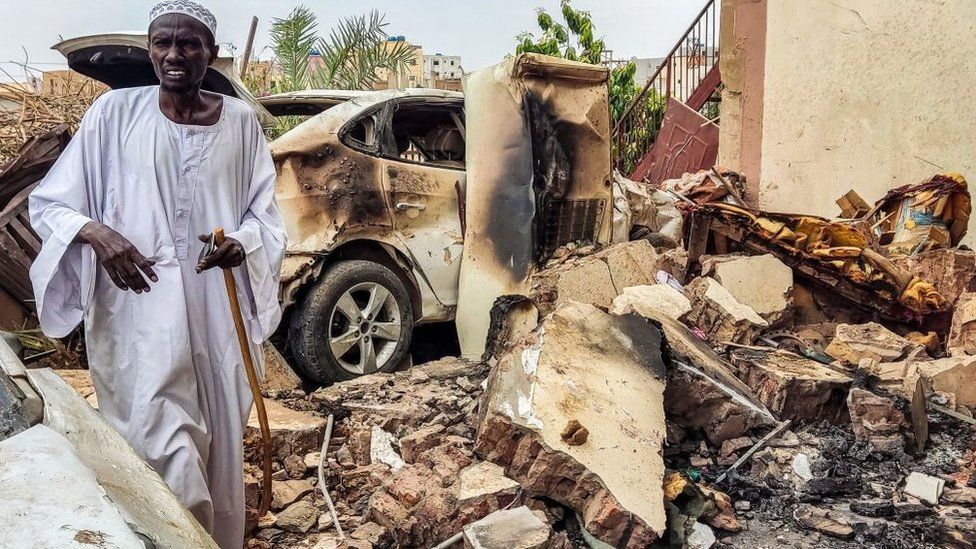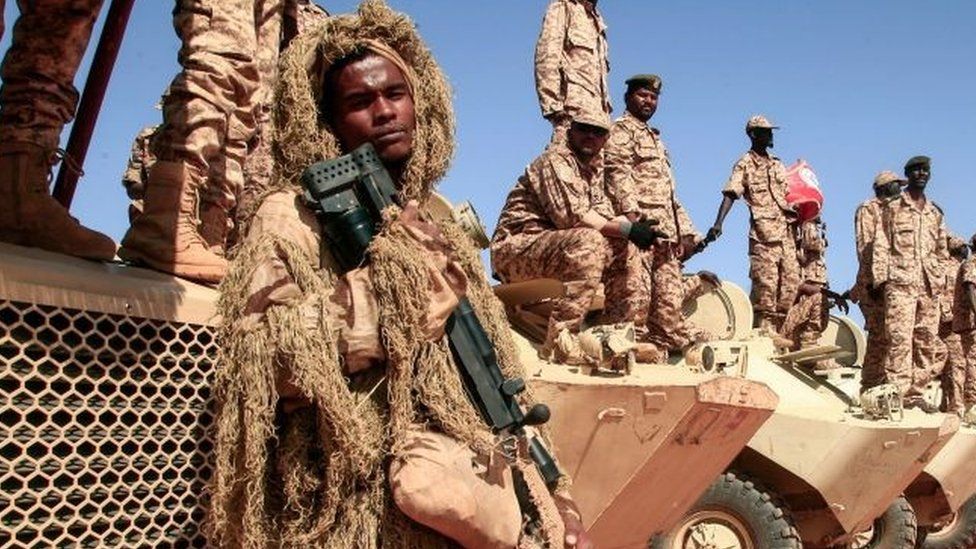The rival paramilitary Rapid Support Forces (RSF) now control a large portion of the capital because the Sudanese army's infantry battalions have been scarcely visible on Khartoum's streets during the conflict that has raged in the nation for two months.
This is despite the army having roughly 200,000 soldiers, which is about twice as many as the RSF.
On the streets of Khartoum and in the neighboring cities of Bahri and Omdurman, the army is vastly outnumbered.
Initially traveling between the three cities in their armored pick-up trucks, RSF fighters now primarily use everyday cars.
The RSF has been accused of stealing many people's cars from their homes, according to numerous social media complaints. They may be utilized by the RSF to evade air strikes, according to speculation.
The military has been conducting strikes to weaken the RSF continuously because its airpower is its greatest asset. They are thought to have killed hundreds of civilians, but the paramilitaries have continued to advance in Khartoum, Bahri, and Omdurman.
RSF fighters attacked one of Sudan's largest military complexes, al-Yarmouk, earlier this month, where weapons were produced and stored, dealing a severe blow to the army.
The RSF announced that it had taken control of the complex while a fire raged there for days, which was corroborated by nearby residents. However, the complex's loss has not been officially acknowledged by the military.
A counteroffensive was launched, but it was only briefly successful in seizing control of a crucial bridge connecting RSF fighters in Omdurman to those in Khartoum and Bahri.
In addition, the RSF is in charge of other significant locations in and around the three cities, including:.
- the primary oil terminal, where the paramilitaries have established a base.
- the head office of the state media, giving the RSF control over its radio airwaves, though the army has been able to keep control of the TV station by broadcasting from another location.
- significant portion of the presidential complex.
- The conflict has caused the closure of much of the international airport.
It was also reported that the RSF had taken up residence in the spy agency's headquarters early in the conflict, but it is currently unknown who is in charge of it.
The military is known to have retained control of a few crucial locations, with its headquarters and the airbase in Wadi Saeedna, from which its fighter jets launch attacks on the RSF, ranking as the two most significant.
To keep the paramilitaries from capturing the two locations, soldiers dug extensive trenches.
"Their attack on us has no effect at this time. The officer stated that the shells they fire "fall on trees or are already cold when they strike our side.
Ten million people, or about two million, have left the formerly tranquil cities, leaving behind their homes, businesses, and offices. Some of them have been bombed and shelled, while others have been occupied and looted, with furniture and air conditioners among the things the RSF carted off.
Some people do not find it surprising that the infantry battalions did not significantly improve their position on the battlefield given that Sudan is not a democratic country with a well-trained professional army.
The army continues to be plagued by Sudan's history of racism, slavery, and colonialism, just like many other facets of society.
It dates back more than two centuries to the establishment of a slave army by Ottoman and Egyptian conquerors.
Under British rule, and throughout the post-independence era, recruitment from primarily underprivileged black African communities has persisted. In actuality, some of the soldiers have slave-owner ancestry.
Black Africans were infrequently admitted to Sudan's military college during the three decades that the former President Omar al-Bashir ruled the country. Applicants had to identify their ethnic groups.
As a result, only a small number of people have attained senior positions, and the army is largely governed by generals from the wealthy Arab and Nubian elites who live on Egypt's border.

According to Sudan's brief-lived civilian Prime Minister Abdallah Hamdok, soldiers make only $11 (£8.5) to $16 per month, while generals have amassed wealth by establishing businesses and factories that have given them control of 80% of the economy.
Some soldiers even joined the RSF to fight due to their low pay; they once participated in the Saudi-Emirati coalition in Yemen in exchange for huge sums of money.
After his forces seized control of Sudan's most profitable gold mines in 2017 and the border with Chad and Libya, RSF commander Mohamed Hamdan "Hemedti" Dagalo became a significant gold trader.
Sudan's army chief of staff did not like it because he wanted the proceeds from the gold trade to be used to bolster the regular forces, but Bashir had faith in the RSF and gave Hemedti the moniker "Himayti," which means "My Protector," because he had confidence in them.
A training camp was established close to Khartoum. The importation and installation of machine guns on hundreds of Land Cruiser pickup trucks.
The RSF established itself as Sudan's de facto infantry with a force of 80,000 to 100,000 men and more than 10,000 armed pick-up trucks.
The RSF is composed primarily of Arabs from Darfur. They seem to think that now is their time to rule, especially in light of their crucial assistance in the military's fight against the Darfuri rebels in the 2000s.
One of the RSF's greatest advantages is that many of its "battalions" are made up of individuals from the same family or ethnicity, and as a result, they fiercely fight to defend one another.
In contrast, the defence minister was compelled to request the mobilization of retired military personnel in order to defeat the RSF.
Many Sudanese ridiculed his appeal because they saw it as more evidence of the army's flaws.
The truth is that the Sudanese army has long relied on militias to fight wars rather than on its own. It also carried out this action more recently in Darfur, where Arab militias were charged with committing a genocide, following a protracted civil war that ended in 2011 with the independence of South Sudan.
Sudan is currently experiencing its most recent crisis as a result of those militias, which were heavily armed by the military.








